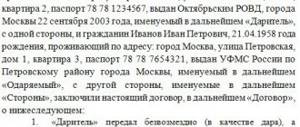The essence of the agreement
A gift agreement (or deed of gift) is a transaction concluded between two parties without any conditions and on a gratuitous basis.
It is quite widespread in the real estate market. Within the framework of the law, this agreement represents the process of transferring property rights from the donor to the donee. Moreover, this transaction is based only on mutual agreement. If the donee does not wish to accept the gift, then this process has no legislative force. Thus, property transferred from one subject of a transaction to another presupposes the existence of a contractual relationship, that is, a deed of gift is a type of such legal concept as an agreement.
What types of gift agreements exist in 2021?
There are 3 main types of gift deeds:
- Consensual , also called a promise of gift, is an agreement containing clauses establishing at what point the transaction begins to take effect and under what circumstances. If the donee refuses to accept one of these points, the transaction loses legal force.
- A real gift agreement is the actual transfer of ownership rights to the object of the transaction, which previously belonged to the donor himself.
- Donation agreement , which is characterized by the gratuitous transfer of rights to legal entities and individuals in order to obtain a common benefit. At the same time, the donee is obliged to maintain an appropriate report on transactions carried out with the participation of the donated property.
Whatever features all these types of deeds have, they are all united by one function. Each of them is characterized by the free provision of property as a gift.
We will look at each of them in more detail below. But first, it is worth considering the basic concepts of the transaction as a whole.
Concept of a deal
The document is an agreement between two entities (donor and recipient), according to which one subject of the transaction transfers to the second (or undertakes to necessarily transfer in the future) ownership of property rights or the property itself.
One type of legal relationship between different individuals is a transaction involving a gift. This operation means the gratuitous transfer of any property.
It could be:
- amount of money;
- real estate;
- rights of claim.
At the legislative level, the concept and types of gift agreement are enshrined in the Civil Code of the Russian Federation, Art. No. 572, art. No. 582 Ch. No. 32, as well as other articles of this chapter.
According to this article, a transaction is recognized as the actions of legal entities and individuals. Their main focus is changing any rights or obligations during the agreement process.
The following main features of a transaction of this type are distinguished:
- the emergence of a legal relationship between the participants;
- narrow focus of the legal action being performed;
- legality;
- voluntariness.
Only if all of the above features are present, a legal action can be classified as a transaction. If it is committed by force or other illegal means, then this action is considered invalid.
The term "rent" is of French origin and means "given away."
Economists understand rent as income from property. Lawyers understand by rent, in addition to income from property, the amount of insurance payment or income from government securities.
In legal literature, annuity is understood in the sense of an institution of civil law, a special contract, the basis of which is a permanent annuity, life annuity or lifelong maintenance with dependents.
According to Art. 583 of the Civil Code of the Russian Federation, an annuity contract is an agreement under which the annuity recipient transfers ownership of property to the annuity payer, and the annuity payer undertakes, in exchange for this property, to periodically pay rent to the recipient in cash or in kind.
1. This is a real contract.
2. This is a paid contract, because the property is transferred against the payment of rent.
3. This is a unilaterally binding contract. The recipient of the annuity has rights, but the payer of the annuity has only obligations.
4. It is of a trusting (fiduciary) nature.
5. It refers to aleatory transactions (risky and dependent on certain circumstances).
The rent agreement is regulated by §1 of Chapter 33 of the Civil Code of the Russian Federation, and certain types of rental contracts are regulated by other paragraphs of Chapter 33. The rules of purchase and sale may be applied to rent in a subsidiary manner if a condition is provided for the redemption of property or a gift agreement, if the property is transferred free of charge to the rent payer .
Rent agreements currently do not require state registration, and the rent itself is taken into account in the Unified State Register of Real Estate as an encumbrance on real estate.
1. Information about the persons (parties) to the agreement. The annuity recipient is usually an individual or a non-profit organization. Rent payers can be individuals and legal entities, as well as public legal entities.
We suggest you read: MTS office where you can terminate the contract
2. Information about the property that is transferred for rent. It can be movable or immovable. In relation to real estate we are talking about land plots, apartments, residential buildings, etc.
a) In a fixed amount of money;
b) In physical terms
The amount of rental payments depends on the type of rental contract, the presence or absence of the right to repurchase the property transferred under the rental contract.
4. The form of the annuity agreement has the mandatory nature of a notarized transaction.
5. The agreement establishes the encumbrance of the property for the payment of rent. It is subject to state registration for real estate.
Rent as an obligation is a property legal relationship. The creditor and debtor are bound by relative rights and obligations, and the encumbrance of property follows the obligation.
Subject and features of the deed of gift
The first criterion for a gift is the mandatory presence of the necessary legal characteristics that are inherent in such an agreement and established in accordance with current legislation. Namely:
- Free transaction.
This is a mandatory condition, according to which the donor, when transferring an object into ownership to the donee, does not have the right to demand any compensation from him (this rule also applies to services). But this does not mean at all that donation is not made for selfish purposes. At the same time, everything that relates to the interpersonal relations of the parties to the method of alienation of property under consideration is outside the jurisdiction of the law.
- The recipient's consent to accept the gift.
If a person refuses to accept an apartment, house, car or any other property, he has the legal right not to accept the terms of the transaction.
- Property sign.
That is, when concluding a gift agreement, the donor’s property decreases, while the donee’s property increases. This feature is considered quite controversial today, due to innovations in legislation and due to the development of the industry.
ARTICLE RECOMMENDED FOR YOU:
Vehicle donation agreement - form and sample 2021
Thus, if a transaction meets all the criteria listed above, it can be considered legal and “clean”. At the same time, there remains one more rule, failure to comply with which can lead to challenging the deed of gift, namely, the compliance of the subject of the agreement.
Expert opinion
Oleg Ustinov
Practicing lawyer, author of the website “Legal Ambulance”, one of the co-founders of the “Our Future” foundation.
According to Article 572 of the Civil Code of the Russian Federation, not only material things, but also certain obligations or services can be the object of donation.
Today, as a rule, small transactions are concluded orally, and for large ones, written documentation is required. The most common objects of gifting in 2021 are:
- equipment and jewelry;
- loans and money;
- a share in an LLC, as well as part of an apartment, residential building, dacha and other real estate;
- car, as well as other vehicles;
- garage, apartment, house and land.
Types of deed of gift by time
From the point of view of the legislation of the Russian Federation, this agreement is regulated by Article 572 of the Civil Code. It says that a person who gives his property to another individual free of charge or completely releases the other party from the obligation to dispose of it is called the donor, and the opposite subject of the transaction is called the donee.
It is noteworthy that depending on the time frame, this agreement can be real and consensual. The first type is an agreement, the force of which comes when it is signed by both parties. The second category involves a promise to give something free of charge in the future.
In addition to the simple written form, there is also a notarial written form. The differences between these two categories are significant. A gift agreement drawn up in the presence of a notary is a guarantee of protection of the rights of interests of both the donor and the recipient, which applies both to the present and to the future.
At the same time, the legal force of such a document is great. Before drawing up an agreement, the notary must verify the legal capacity and full sanity of both parties, as well as verify the authenticity of the signatures of the participants. And only then begins to compile the document. In the event of a dispute, these measures are fundamental criteria for recognizing the deed of gift as valid. It is worth noting that even the loss of a document will not be a tragedy. A copy can always be obtained from a notary if desired.
Contract form
The form of deed of gift can be either oral or written.
An oral contract is usually concluded when transferring household or personal items of small value.
Good to know! A legally executed deed of gift is needed when transferring property that needs to be registered or if the value of the gift exceeds five minimum wages. A consensual gift agreement requires legal registration, otherwise it is impossible to confirm the fact of the agreement. You also need to indicate the timing of the transaction.
A written agreement can be concluded either with a lawyer or independently, using standard forms. The advantage of a form certified by a lawyer:
- the interests of all parties to the transaction are protected;
- you can request a copy from a lawyer if the contract is lost;
- the lawyer confirms the authenticity of the signature, as well as the legal capacity of the parties during the period of concluding the deed of gift.
Donation
A donation means the same gift. One of the few differences is that the donation is for a socially beneficial purpose. The donation is made for charitable purposes to various educational and medical organizations, shelters, nursing homes, etc.
Important details:
- No one's consent is required in this situation.
- When making a donation, the purpose for which the funds should be spent must be specified.
Unlike a gift, the disadvantages exist only for one party, namely the recipient of the funds. This is due to the fact that the donor can clearly stipulate what the donated funds should be spent on.
Often, organizations have more pressing needs than those indicated by the donor, but they have no right to spend the money in any other way.
Typically, small donations are made verbally. The provision of funds in large quantities is documented.
The gift agreement is almost always executed in writing. When donating real estate, the agreement must be notarized. The transfer of rights under an agreement is subject to state registration in the manner prescribed by law.
This type of donation is an agreement whereby the donee can use things or rights only for generally beneficial purposes.
We invite you to read: The moment of concluding a gift agreement - advice from lawyers and lawyers
Donations are made to legal entities and individuals, charitable organizations, educational institutions, museums, etc. There are even donations across the entire country, not just individuals or organizations.
To accept a donation, you do not need to obtain a special document or permission.
The agreement is concluded both orally and in writing. Transfer of a thing implies the delivery of documents or the thing itself to a person.
Sometimes what is called “symbolic transmission” takes place. It assumes that it is not the property itself that is being transferred, but only documents for it or other attributes. For example, a key fob or a lock.
Real gift agreement
It is the most frequently used deed of gift option. Its main difference from other types is the complete exclusion of the formation of contractual offenses between the parties to the transaction.
From a legal point of view, this agreement is a legal fact, the formation of which is at the same time the actual reason for the recipient’s right to dispose of the object of the transaction at his own discretion.
At the same time, he acquires the right of ownership of the gift transferred to the donee immediately at the time of concluding an agreement with the previous owner or as a result of the official registration of the object (for example, real estate).
Differentiation according to the subject of the agreement
1. The donor may assume the debts of the donee with the absolute consent of the creditor. Thus, he releases his ward from any property obligation to a third party.
2. The donor has the right to transfer personal belongings to the donee.
3. In addition, this agreement may be a contract in which one party completely releases the other from any obligations in relation to its property.
4. The donor may give the donee his right in relation to a third party. From a legal point of view, this is called assignment of claims.
5. A person has every right to transfer his property rights to another person.
What does it mean
A gift agreement is a civil legal act, under the terms of which the donor undertakes to transfer or immediately transfers the gift of ownership or property to the recipient free of charge. Important: this document must fully comply with all the criteria required in a particular case.
The donation document must contain its main features:
- Gratuitousness - according to the law, when transferring a gift, one cannot require payment for it or any equivalent item in return;
- Signs of consent of the donee - if a person is against accepting the gift, he has every right to declare the agreement void in court;
- A property sign - its presence is required by some jurists - in the process of donation, at the same time, the property of one participant in the process should decrease, and that of the other should increase.
What is a gift deed? Photo: myshared.ru
Important: after the main three signs, it is necessary to determine the conformity of the subject of the contract, and it is necessary to take into account the requirements of Art. 572 of the Civil Code of the Russian Federation, which states that both property and the right to claim can act as a gift.
Civil Code of the Russian Federation Article 572. Donation agreement
1. Under a gift agreement, one party (the donor) gratuitously transfers or undertakes to transfer to the other party (the donee) an item of ownership or a property right (claim) to himself or to a third party, or releases or undertakes to release it from a property obligation to himself or to a third party .
If there is a counter transfer of a thing or right or a counter obligation, the contract is not recognized as a donation. The rules provided for in paragraph 2 of Article 170 of this Code apply to such an agreement.
2. A promise to transfer a thing or property right to someone free of charge or to release someone from a property obligation (promise of donation) is recognized as a gift agreement and binds the promisee if the promise is made in the proper form (clause 2 of Article 574) and contains a clearly expressed intention to commit future gratuitous transfer of a thing or right to a specific person or release him from property obligations.
A promise to donate all of one’s property or part of one’s entire property without indicating a specific object of donation in the form of a thing, right or release from an obligation is void.
3. An agreement providing for the transfer of a gift to the donee after the death of the donor is void.
The rules of civil inheritance law apply to this type of gift.
The transfer of which gift is accompanied by a written agreement
The gift of small household items is accompanied by a verbal agreement; larger and more precious items are accompanied by a written agreement. There is a list of valuable gifts:
- Jewelry and household appliances;
- Amounts of money;
- The right to share in common residential property;
- Movable property;
- Part of a residential building;
- Any real estate in full.
How can I cancel an apartment donation agreement? See the article at the link.
Registration
According to the Civil Code of the Russian Federation, notarization of the gift agreement is not required (Article No. 574 of the Civil Code of the Russian Federation). Also the basis for this is the edition of Law No. 122-FZ of July 21, 1997 “On state registration of rights to real estate and transactions with it.”
There is no need to notarize the text of the document in question.
The article will tell you what is the difference between a gift agreement and a will:
“Which is better, donation or inheritance”
.
This page will tell you about the procedure for drawing up a gift agreement.
What are the taxes on a real estate gift agreement? Read here.
The absence of this legal action does not in any way detract from the power of the document. But if the parties concluding a transaction wish to carry out the certification process, then this can be done on completely legal grounds; the legislation does not prevent this.
Today, transactions of the types in question must be registered if they involve real estate - in accordance with Art. No. 574, clause 3 of the Civil Code of the Russian Federation (amendment from 03/01/13).
Registration of ownership of real estate, as well as land plots, is carried out in accordance with Law No. 122 “On state registration of rights to real estate and transactions with it” dated January 31, 1998.
The registration procedure itself is carried out by a special body - the Federal Registration Service of Cadastre and Cartography. To register, you need to collect a package of documents, including:
- text of the agreement (in 3 copies);
- registration application;
- certificate of state registration (donor's rights to real estate);
- title documents;
- real estate documents;
- notarial consent of the spouse to perform the act of donation;
- copies of passports of the parties who entered into the agreement;
- receipt for payment of state duty.
After registration has been completed, the person who submitted the documents will be issued the registered text of the document confirming the transaction in writing (if concluded before 03/01/13).
An extract from the Unified State Register or a certificate of ownership is also presented (based on Law No. 122-FZ, clause 1, art. No. 14).
Gifting has many different legal nuances. All of them must be observed, since otherwise the transaction itself will not be considered valid.
To register a gift agreement, you will need a package of documents: an agreement, an application for state registration, the donor’s title document for the property, a receipt for payment of the state duty.
There are several ways to submit documents for registration: in person, online or by registered mail with notification.
To register ownership of an apartment alienated under a gift agreement, both the donor and the donee apply to Rosreestr.
We invite you to read: Penalty for rent of non-residential premises
When donating expensive items, experts recommend having the transaction certified by a notary in order to protect yourself from the risks associated with the contract. For example, from the appearance of other persons who will challenge the donation and create unnecessary problems for you.
Cancellation of deed of gift
There are two procedures for recognizing the cancellation of a contract – challenge and cancellation. In the first case, a court decision is necessary, in the second - a decision of the parties to the transaction.
You can challenge the contract only after the donated property is completely transferred to the new owner. Otherwise, the court will not accept the statement of claim on the grounds that the event has not yet occurred.
As long as the donor is alive, only he himself can challenge his contract. After his death, only relatives of the donor, who as a result of the transfer of property have lost a potential inheritance, can challenge the contract. Only they must prove that they actually had rights to the inheritance.
During the life of the donor, the contract can also be challenged by:
- persons whose interests were affected during the transfer of rights under a sham or imaginary transaction;
- co-owners of real estate who did not give permission for the transaction;
- guardians of the incapacitated donor.
Cancellation of the contract can occur at the preliminary stage and after approval by the relevant government agencies. In the first case, one of the parties or both can change their mind. In addition, the transaction may not take place due to incorrect drafting of the contract, which cannot be accepted by the state registration authorities.
Once the agreement is approved, it may be canceled on the grounds that the new owner has caused harm to the donor and/or the property. The simplest procedure for cancellation is in the event of the death of the donee before ownership takes effect.
An agreement may be declared illegal if it turns out that the gratuitous transfer of real estate to another person was actually carried out for selfish reasons. For example, this way you can avoid confiscation and other troubles.
Responsibilities of the donee
All these types are different, but they have one thing in common - gratuitousness. However, it does not protect the donee from fulfilling certain property obligations. The agreement may contain some clauses that limit the rights of the recipient. For example, a gift agreement may contain obligations under which the recipient must use the received property for public purposes, or he becomes the owner of only a certain part of it.
Signing such an agreement has a specific purpose. It represents an increase in the property of the donee at the expense of the donor. If amendments are made to this agreement for the reciprocal receipt of things or rights, this document becomes a type of purchase and sale or exchange agreement.
Contract of promise of gift
It (also called consensual) allows you to document the desire of the donor to transfer this or that object into ownership rights to the donee not at the moment, but a little later.
A consensual gift agreement must be drawn up in simple written form.
In this agreement, it is necessary to indicate information about the object, which in the future should be donated free of charge, as well as information about the person acting as the donee (you can download an example sample from this link).
If the above information is not present in the promise of gift agreement, then such an agreement is considered void.
Objects and subjects of the agreement
Russian legislation allows you to give almost everything:
- property rights;
- personal belongings;
- real estate;
- securities;
- movable property.
A gift agreement provides for the presence of two parties: the donor and the donee. Both the first and second subjects can be:
- individuals;
- state;
- legal entities.
The state can become a donor in any of the cases provided for by law, which cannot be said about the position of the state as a donee. Only under a donation agreement can it act as the second party to the transaction.
Normative base
The main feature of a gift agreement is the free transfer of a house, car or other property to another person.
The legislative norms that regulate the rules for drawing up such an agreement, as well as the relationship between the donor and the donee, are contained in Art. 572 Civil Code.
- real. The donor has a desire to donate any object of property and immediately formalizes a transaction to fulfill this desire;
- consensual. The donor expresses in writing his desire to transfer any property free of charge in the future.
The parties to the agreement can enter into a transaction either in ordinary written form or in notarial form. If a notary is involved in concluding a transaction, the parties can receive a duplicate of the deed of gift in the event that in the future their copy is lost or destroyed under unfavorable conditions.
The notary also acts as a witness to the conclusion of the transaction between the donor and the donee and, in the event of legal proceedings, can confirm the fact of execution of the gift agreement on a voluntary basis.
Partially or completely incapacitated persons cannot receive property as a gift. In addition, the law prohibits an employee of a medical, municipal or educational body to act as a donee.
Two types of agreement formation
A gift agreement, in accordance with Russian legislation, can be drawn up in two forms:
- oral;
- written. It is noteworthy that in some cases the created document is subject to mandatory state registration. For example, when transferring property rights to real estate. In this case, the agreement is concluded in simple written form. It is then registered with the relevant authorities.
The deed of gift is drawn up in simple written form if:
- the contract is drawn up for the future - it is consensual;
- if the donor is a legal entity and the value of the proposed gift is estimated at more than five minimum wages, the amount of which is established by the state.
In other situations, an oral agreement can be drawn up. In this case, you can donate personal and household items. If the form for drawing up the agreement was chosen incorrectly, then this agreement is considered void, that is, invalid.
Donation agreement
Today, by the donation procedure as a result of concluding an appropriate gift agreement, lawyers mean the actual transfer of a certain object of the transaction to a citizen in order to comply with socially beneficial interests. When transferring a gift to an individual, the deed of gift must be concluded with a mandatory determination of the purpose of the object of the agreement. If, as a result of the transaction, property is transferred as a gift to legal entities, the above condition is not considered mandatory.
At the same time, if the desired instructions for the purpose of the object of donation are not fixed in the agreement, the concluded transaction will be equated to an ordinary deed of gift. In this situation, legislative norms will not impose an obligation to strictly comply with the donor’s instructions when using the object.
In the event that property is donated to a legal entity with the intended use of the gift established in the contract, the recipient is obliged to carry out appropriate accounting for all transactions related to this property.
Expert opinion
Oleg Ustinov
Practicing lawyer, author of the website “Legal Ambulance”, one of the co-founders of the “Our Future” foundation.
If various obligations arise that prohibit the use of the object of the gift for the purpose established in the contract, the exploitation of the gift in a different way can be carried out in the future only after receiving the donor’s donated property for such treatment. After the death of the donor, who was an individual, or the liquidation of a legal entity, the agreement and all its terms can be reviewed in court.
Thus, if the recipient of the transaction begins to use the gift for purposes that differ from those specified in the gift agreement, the donor, and after his death, his heirs of the first group or other legal successors will have the legal right to challenge the agreement by canceling the donation.
ARTICLE RECOMMENDED FOR YOU:
Real estate gift tax from 2021 for individuals - how much you will have to pay
The list of persons who can act as recipients in a donation agreement is established at the legislative level. It includes:
- natural person;
- organizations with a public legal positioning;
- educational, charitable and scientific institutions, as well as various cultural institutions;
- social protection institutions, as well as those whose activities are of a therapeutic and educational nature.
- Non-profit and public organizations, as well as various religious entities.
All subjects who are provided for by the norms of civil legislation have the right to act as a donor.
It is worth noting that you do not need to obtain permission or consent from others to make a donation.






